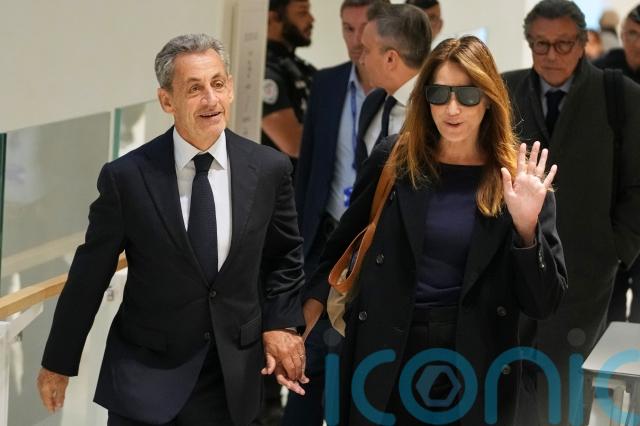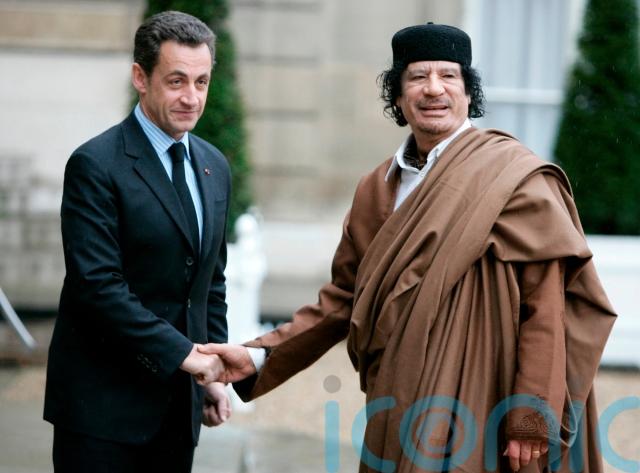
A Paris court found former French president Nicolas Sarkozy guilty on one charge but acquitted him of others on Thursday in his trial for the alleged illegal financing of his 2007 presidential campaign with money from the government of then-Libyan leader Moammar Gadhafi.
The court has not immediately sentenced the 70-year-old Sarkozy. That step is expected to come later in the court proceedings on Thursday.
Sarkozy can appeal against the guilty verdict, which would suspend any sentence pending the appeal.
The court found Sarkozy guilty of criminal association in a scheme from 2005 to 2007 to finance his campaign with funds from Libya in exchange for diplomatic favours.
But it cleared him of three other charges including passive corruption, illegal campaign financing and concealment of the embezzlement of public funds.
Criminal association is a serious charge, carrying a potential sentence of up to 10 years in prison. Prosecutors have argued for a seven-year prison sentence.
The court also found two of Sarkozy’s closest associates when he was president – former ministers Claude Gueant and Brice Hortefeux – guilty of criminal association but likewise acquitted them of some other charges.
Overall, the verdicts appeared to suggest that the court believed that the men conspired together to seek Libyan funding for Sarkozy’s 2007 campaign but that judges were not convinced that the conservative leader himself was guilty of then putting the scheme in place.
Sarkozy, accompanied by his wife, the singer and model Carla Bruni-Sarkozy, was present in the courtroom, which was also filled with reporters and members of the public. Sarkozy sat in the front row of the defendants’ seats. His three adult sons were also in the room.

With the verdict, Sarkozy becomes the first former French president found guilty of accepting illegal foreign funds to win office.
Sarkozy, who was elected in 2007 but lost his bid for re-election in 2012, denied all wrongdoing during a three-month trial that also involved 11 co-defendants, including three former ministers.
Despite multiple legal scandals that have clouded his presidential legacy, Sarkozy remains an influential figure in right-wing politics in France and in entertainment circles, by virtue of his marriage to Bruni-Sarkozy.
The accusations trace their roots to 2011, when a Libyan news agency and Gadhafi himself said the Libyan state had secretly funnelled millions of euros into Sarkozy’s 2007 campaign.
In 2012, the French investigative outlet Mediapart published what it said was a Libyan intelligence memo referencing a 50 million-euro funding agreement. Sarkozy denounced the document as a forgery and sued for defamation.
French magistrates later said that the memo appeared to be authentic, though no conclusive evidence of a completed transaction was presented at the three-month Paris trial.
Investigators also looked into a series of trips to Libya made by people close to Sarkozy when he served as interior minister from 2005 and 2007, including his chief of staff.
In 2016, Franco-Lebanese businessman Ziad Takieddine told Mediapart that he had delivered suitcases filled with cash from Tripoli to the French Interior Ministry under Sarkozy. He later retracted his statement.
That reversal is now the focus of a separate investigation into possible witness tampering. Both Sarkozy and his wife were handed preliminary charges for involvement in alleged efforts to pressure Mr Takieddine. That case has not gone to trial yet.
Mr Takieddine, who was one of the co-defendants, died on Tuesday in Beirut, his lawyer Elise Arfi said. He was 75. He had fled to Lebanon in 2020 and did not attend the trial.
Sarkozy was tried on charges of passive corruption, illegal campaign financing, concealment of the embezzlement of public funds and criminal association.

Prosecutors alleged that Sarkozy had knowingly benefited from what they described as a “corruption pact” with Gadhafi’s government.
Libya’s longtime dictator was toppled and killed in an uprising in 2011, ending his four-decade rule of the North African country.
The trial shed light on France’s back-channel talks with Libya in the 2000s, when Gadhafi was seeking to restore diplomatic ties with the West. Before that, Libya was considered a pariah state.
Sarkozy has dismissed the allegations as politically motivated and reliant on forged evidence. During the trial, he denounced a “plot” he said was staged by “liars and crooks” including the “Gadhafi clan”.
He suggested that the allegations of campaign financing were retaliation for his call – as France’s president – for Gadhafi’s removal.
Sarkozy was one of the first Western leaders to push for military intervention in Libya in 2011, when Arab Spring pro-democracy protests swept the Arab world.
“What credibility can be given to such statements marked by the seal of vengeance?” Sarkozy asked in comments during the trial.
In June, Sarkozy was stripped of his Legion of Honour medal – France’s highest award – after his conviction in a separate case.
Earlier, he was found guilty of corruption and influence peddling for trying to bribe a magistrate in 2014 in exchange for information about a legal case in which he was implicated.
Sarkozy was sentenced to wear an electronic monitoring bracelet for one year. He was granted a conditional release in May because of his age, which allowed him to remove the electronic tag after he wore it for just over three months.
In another case, Sarkozy was convicted last year of illegal campaign financing in his failed 2012 re-election bid. He was accused of having spent almost twice the maximum legal amount and was sentenced to a year in prison, of which six months were suspended.
Sarkozy has denied the allegations. He has appealed against that verdict to the highest Court of Cassation, and that appeal is pending.
Subscribe or register today to discover more from DonegalLive.ie
Buy the e-paper of the Donegal Democrat, Donegal People's Press, Donegal Post and Inish Times here for instant access to Donegal's premier news titles.
Keep up with the latest news from Donegal with our daily newsletter featuring the most important stories of the day delivered to your inbox every evening at 5pm.